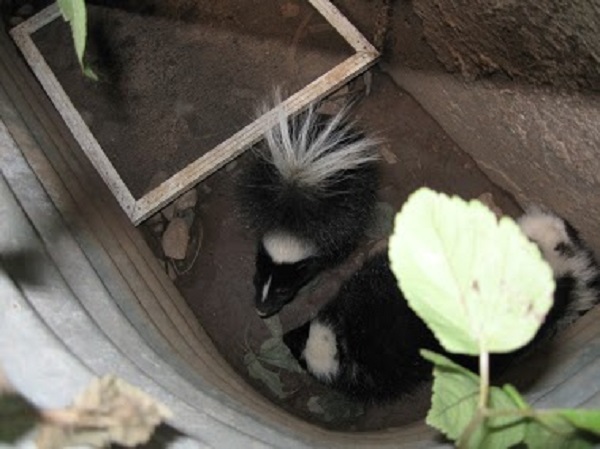Skunk odors are almost legendary. Strangely enough, skunk spray is never used between two skunks; it’s only used against predators. This musk is strong enough to keep a bear, coyote or horned owl away.
Most skunks use their spray sparingly because they don’t have an unlimited supply. It takes time to make the liquid, and once it is depleted, it leaves the animal vulnerable. Once sprayed, the stench lingers for days, up to three weeks if untreated. It’s one of nature’s most unpleasant emissions.
How Does Skunk Spray Affect Humans?
Skunks release a small squirt of their spray to make a threat, human or animal, go away. The spray is an organic compound that is mostly sulfur and is very potent. It can be smelled up to half a mile away, making it an effective deterrent against most animals. Besides the odor, it can have other effects on humans and animals:
- Nausea and vomiting – The smell can be stomach-turning. If any spray gets in the mouth, the person may throw up or experience diarrhea.
- Respiratory problems – Skunk odor can cause breathing issues. People with conditions that affect their respiratory systems, such as COPD or asthma, may have problems breathing.
- Eye problems – If the spray hits your face, it could cause eye irritation, itching or burning. Depending on the directness of the hit, it could also cause temporary blindness. If you experience serious medical issues, such as an asthma attack or serious vomiting, you should check with your doctor.
What Should You Do If You Are Sprayed?
If you, your child or pet is sprayed, don’t panic. If the spray got in the eyes, gently rinse them with lukewarm water for a few minutes. You may need to take your pet to the vet for help removing the musk. If none of the liquid got in the eyes or mouth, you just need to remove the smell. Ideally, don’t go back inside if you can avoid it; otherwise, try to stay in one area of your home to keep the smell from getting in other rooms. Throw away the clothes you’re wearing because the smell will permeate the fibers and be difficult to get out. The smell may also get inside your washer and dryer, contaminating future loads.
Take a shower or bath immediately. Baking soda can help neutralize the odor. Dishwashing soap is good at dealing with the oil in the spray because it is an effective grease cutter. While homemade remedies can help mask the smell in the short-term, they probably won’t remove the smell completely. Look for a commercial skunk spray remover at the pet supply store or hardware store.
It may take a few treatments before the smell is gone. If the odor gets into your home, open the windows to air it out. Increase circulation with fans and change the air filters.
How Can You Protect Yourself Against Being Sprayed?
Prevention against skunk spray is the best remedy. If you come across a skunk, quietly back away. Teach your children never to touch wildlife and make your property less appealing to skunks and other wildlife:
- Seal up your trash cans with tight-fitting lids.
- Don’t leave fruit on the ground or vegetables in your garden.
- Place a fence around your property and garden areas.
- Store pet food inside and don’t leave food out overnight.
- Patch up holes around your foundation to eliminate den sites.
- Install bright lights or noise machines to keep skunks out of your backyard; before your pet goes outside, turn on the lights to scare away wildlife.
If you do see a nest or den on your property, contact our professional skunk removal team in Madison to take care of the problem. Skunk spray isn’t poisonous, but there are many other dangers when trying to remove wildlife from your property.




